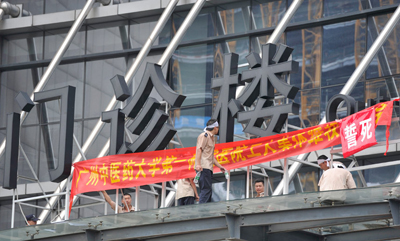On 15 April 2014, Meng Han was seated on a cheap plastic chair in a Guangzhou courtroom with 11 other defendants listening to the judge read out their sentences for “assembling a crowd to disrupt public order.”
The 12 defendants, all security guards at the Guangzhou Chinese Medicine University Auxiliary Hospital, had been arrested eight months earlier in August 2013 after staging a rooftop protest at the hospital’s refusal to discuss the workers’ long-standing grievances over employment contracts and social insurance.
Meng, the leader of the security guards, was given the longest sentence; nine months in prison. He was half obscured by police and court officials and by the crowd of supporters and journalists packed into the court room but when the judge asked the defendants if they wished to appeal their sentence, Meng Han made his presence felt.
“I will appeal,” he replied immediately, his distinctive husky voice cutting through the throng to reach all four corners of the room.

Meng Han after his release from jail.
Just over a month later, Meng was free man, having served his sentence in full. Sitting on a much more comfortable chair in a Guangzhou restaurant that serves food from his home town in Hubei, he explained how he is determined to continue playing a leading role in the workers’ movement but is now taking a more measured, long-term approach.
“I want to live my life to the fullest and nurture more and more workers’ leaders for the future,” he explained.
But before embarking on this path, Meng said he needed to get his family’s full support: “I have already talked my wife about a career in protecting workers’ rights, and now it is my father’s turn, I will have a long conversation with him first thing tomorrow. We haven’t been able to talk face-to-face for quite some time now.”
Meng is particularly well-qualified for the path he has chosen. Now in his early fifties, he had worked for 17 years on the boats for the Yangzi River Authority in Hubei before he was laid off in the wave of state-owned enterprise restructuring in the late 1990s and early 2000s. Like many other laid-off workers at the time, he struggled to find a steady job in his home town. In 2010, he moved to Guangzhou in search of better prospects.
“With no other skills, I could only apply for jobs like security guards, and the Guangzhou Chinese Medicine University Auxiliary Hospital happened to be recruiting at the time,” he said. “It is a big institution and close to my place, so that is where I went. But it wasn’t long before I found out that there was something not right.”
Three months into the job, Meng organised more than 60 security guards who were employed through an employment agency to demand equal pay for equal work and the right to join the hospital union. Although Meng and his colleagues were refused union membership, they did manage to get the hospital to pay the same benefits as their union counterparts, such as annual trips and holiday subsidies.
“I guess my own consciousness as a worker woke up then,” said Meng. “Over time, my colleagues and even those security guards directly employed by the hospital started to recognise my abilities, and that made me realise that I could do more for this group of people as their representative.”
Meng and the 11 arrested security guards were at the centre of a long-running dispute with hospital management over the lack of formal labour contracts, equal pay for the equal work, social insurance arrears and overtime payments.
The dispute involved some 126 healthcare workers and security guards, who took turns to stage protests on the steps of the hospital for nearly three months, In August 2013, the hospital management finally cut a deal with the healthcare workers but left the security guards in the lurch. Meng, who had been elected as the workers’ chief negotiator, tied to get management to return to the negotiating table but to no avail. It was only then that 14 of the security guards staged a protest on the roof above the hospital entrance. (See photo below) They were detained by the police and 12 of them were later charged with “assembling a crowd to disrupt public order.”

During the long struggle with hospital management, Meng had several meetings with veteran labour lawyer Duan Yi, the head of the Shenzhen-based Laowei Law Firm.
“Duan Yi was an inspiration and I have nothing but the highest regard for him,” Meng said. “I first heard about him on a TV program that profiled his life and work, and I said to myself, if this guy can give up making good money and fight for the underprivileged, why can’t I change my life and begin to take more responsibility for my own people?”
Duan, whose law firm provided free legal assistance and collective bargaining training to the hospital workers, said:
Meng and I don’t need to say too much. Maybe it is because we are of a similar age, but we kind of share a tacit understanding. He has a fighting spirit and he understands the importance of solidarity, but he also has two additional qualities that mark him out as a workers’ leader; persistence and the ability to learn.
Indeed, Meng has already shown that he can rapidly adapt to new developments following his stint in jail. He remains focused and clear about what the job ahead entails:
“What I need to do next is to get systematic training on collective bargaining and labour laws,” he explained. “The healthcare workers have already made the hospital pay up as much as four million yuan in compensation, moreover, it has agreed to compensate some of the security guards who were charged, which means it acknowledges it is on shaky ground morally.”
